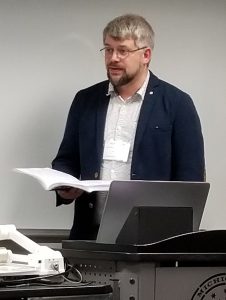Michael A. Conrad
(Kunsthstorisches Institut, University of Zurich)
“Unlocking the Future:
Remarks on the Materiality of Tools of Sortilège”
Abstract of Paper
Intended To be presented at the 55th International Congress on Medieval Studies [CANCELLED]
(Kalamazoo, 2020)
Rescheduled for the 56th International Congress on Medieval Studies
(Kalamazoo, 2021)
Session II of II on
“Revealing the Unknown”
Part II: “Sortilège, Bibliomancy, and Divination”
Co-Sponsored by the Research Group on Manuscript Evidence and the Societas Magica
Organized by Phillip A. Bernhardt–House
2020 Congress Program
2021 Congress Program Planning
[Published on 10 March 2020, with an Update on 17 March 2020 reporting the Cancellation of the Congress as a whole,
and with an Update on 19 November 2020 reporting the Rescheduling for the 2021 Congress]
*****
Abstract
The starting point of the paper is a genre of mantic literature that was popular in the late Middle Ages and known in the German-speaking world under the name of Losbücher.[1] Its character oscillated between an entertaining leisure activity and serious divination. With the help of a certain sortilège technique, which often was described in, or added to, the book, readers were enabled to randomly select a passage that would reveal their future. Different types of randomizers could be applied for the purpose, with the most common ones belonging to the sphere of games, such as playing cards or dice. However, there were also more elaborate devices, for instance modified volvelles with woodcut depictions that would be included to the printed work. Like the literary genre itself, the nature of these random generators equally oscillated between serious exploration and light-hearted diversion.
These tools of bibliomancy are the main topic of the paper. It will also, mostly for purposes of comparison, as well as with the aim of searching historic prototypes, consider techniques of sortilège and bibliomancy in Islam (falnama) and Judaism. By encompassing concepts linked to the Material Turn of current academic research, the main question is how the experience of anticipated future, the concept of human agency, and the design of mantic literature itself were informed by the materiality of the randomizers used. Building on these observations, a consequent issue to be discussed is what rhetorical and epistemological strategies these books used to justify mantic practices as valid forms of knowledge of the future.
_____
[1] Marco Heiles, Das Losbuch: Manuskriptologie einer Textsorte des 14. bis 16. Jahrhunderts, Cologne et al.: Böhlau, 2018.
*****
Biography
Michael A. Conrad was Research Assistant for the project “Mudejarismo and Moorish Revival in Europe” at the Department for Art History at the University of Zurich in Switzerland. Before that, he worked for the Collaborative Research Centre 980 “Episteme in Motion. Transfer of Knowledge from the Ancient World to the Early Modern Period” at the Freie Universität Berlin, and at the Centre for Media and Interactivity (ZMI) at Julius Liebig University Giessen. Michael studied philosophy and theatre research at both the Freie Universität and Johannes Gutenberg University in Mainz; his master thesis examined photography as an artistic technique of self-fashioning.
In his dissertation Michael analyzes how, in the late 13th century, gameplay was understood as a practice for coping with uncertainty; for this work a main source is the Libro de acedrex, dados e tablas (1283/84) commissioned by King Alfonso X of Castile and León (reigned 1252–1284). Michael’s research interests center upon the history and theory of games and play, and the history of medieval Iberia, with a special focus on issues of religious and cultural coexistence.
Publications (Selected)
“Sports and Games in the Middle Ages”, in: Paul R. Milliman, A Cultural History of Leisure, vol. 2: A Cultural History of Leisure in the Medieval Age (500-1450), London: Bloomsbury (forthcoming).
“Architectural Warfare: The Strategic Use of Gothic during the Reigns of Fernando III and Alfonso X for Promoting Castilian Identity”, Justi-Mitteilungen (forthcoming).
“In the Shadow of Toledo and Granada. On the Significance of Murcia for Cultural Exchange and Transmission of Knowledge in the 13th Century,” María Cobaleda (ed.), Dialogues in Late Medieval Mediterranean, London: Palgrave-MacMillian (forthcoming).
*****

Michael Presents His Paper at the the 2019 Congress.
We thank Michael for his continuing contributions to Research Group activities.
See, for example, the Abstracts for his Papers at the Congress and for our Symposia:
- 2018 Congress
- 2019 Congress
- 2019 Congress (You are Here)
- 2019 Symposium
*****
